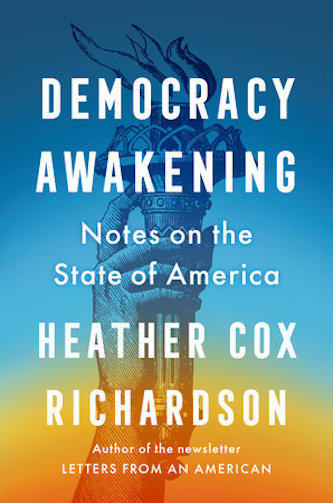Book Review: “Democracy Awakening” — The Rise of Authoritarian Vistas
By Roberta Silman
This is a brilliant book that explains, with engaging clarity, why our politics have reached their current frightening nadir.
Democracy Awakening, Notes on the State of America by Heather Cox Richardson. Viking, 286 pages, $30
 Heather Cox Richardson is a well-known historian and founder of the Substack blog “Letters From an American” which I read every weekday and which has over a million subscribers. It is not too much to say that Heather and a man named Robert Hubbell, who also writes a daily blog on Substack, have kept me sane during these insane times. Hubbell is a retired lawyer and a Democrat and I find his point of view very close to my own. Heather’s Letter is more rooted in examining historical facts that relate to our present day predicament in very interesting and often indispensable ways. She is clearly not a present-day Republican. She has identified herself as a “Lincoln Republican”: she went to Harvard for her BA and PhD and now teaches at Boston College. She has written several books about Reconstruction and the Plains Indians. She also has three kids, was divorced, and recently married her second husband, a lobsterman with whom she shares a house in Maine.
Heather Cox Richardson is a well-known historian and founder of the Substack blog “Letters From an American” which I read every weekday and which has over a million subscribers. It is not too much to say that Heather and a man named Robert Hubbell, who also writes a daily blog on Substack, have kept me sane during these insane times. Hubbell is a retired lawyer and a Democrat and I find his point of view very close to my own. Heather’s Letter is more rooted in examining historical facts that relate to our present day predicament in very interesting and often indispensable ways. She is clearly not a present-day Republican. She has identified herself as a “Lincoln Republican”: she went to Harvard for her BA and PhD and now teaches at Boston College. She has written several books about Reconstruction and the Plains Indians. She also has three kids, was divorced, and recently married her second husband, a lobsterman with whom she shares a house in Maine.
And now she has written Democracy Awakening, a brilliant new book that explains how we have reached this terrible place we are in. It is what she calls “a crossroads.” What struck me as I read was how accessible she makes our history and how useful this book will be to our young people whose knowledge of civics and American history is spotty. Here, in one place, they can learn not only about the Founding Fathers and Lincoln and FDR, but also about Theodore Roosevelt and Grover Cleveland and Lyndon Johnson and other heroes whose vision for our often beleaguered country was as important as their more famous counterparts.
They can also learn about those villains who, as early as the 1950s, helped turn the country toward authoritarianism: Barry Goldwater, William Buckley, Richard Nixon, and Ronald Reagan. Buckley and his henchmen wanted a new “orthodoxy of religion and the ideology of free markets.”Republican nominee Barry Goldwater ran on a platform opposing the 1964 Civil Rights Act. Nixon was determined to undo the progress made in civil rights since Brown vs. Board of Education in 1954. The famously engaging Ronald Reagan — whom people are now holding up as an example of a “good Republican” in comparison with the lunatics now overtaking the party — had his own dark agenda. Heather reminds us that Reagan began his campaign for president in Philadelphia, Mississippi, the very town where civil rights workers Chaney, Goodman, and Shwerner were murdered in 1964. A coded message if there ever was one.
Richardson’s vast knowledge enables her to select moments from history and explain how they have made a direct impact on what is happening now — and to note the ways in which history can be distorted. When people express dismay at all the supporters Trump has been able to hold onto, they can find the answer to this depressing phenomenon parsed clearly when she discusses The 1776 Report, a Trump-commissioned document which:
demonstrated in real time how leaders seeking to undermine democracy have tied American history to their cause. The historical inequality embedded in our founding — that “all men are created equal” — depends on the subordination of minorities and women. Whenever members of marginalized groups seem to approach equality, antidemocratic leaders can drum up supporters by insisting that they are attacking national principles and reducing white men to subservience. Those leaders reject the idea of equality, but, paradoxically, they root that rejection in our founding. Their version of America depends on keeping political power and economic opportunity away from Black and Brown Americans and keeping women in roles as wives, mothers, or sexual objects, as they were in the founding era. To justify that exclusion, it also requires defining the powerless as inferiors, either criminals or weak-minded people unable to think and act for themselves.
When Trump’s followers attacked the U.S. Capitol on January 6, 2021, they were embracing this strand of American history, one that stretches beyond 1619 to the enslavement of Indigenous Americans that began as soon as European sailors dropped anchor off the American continents. That version of history was articulated clearly by the Confederates whose battle flag Trump Republicans carried into the U.S. Capitol on January 6. “I repudiate, as ridiculously absurd, that much lauded but nowhere accredited dogma of Mr. Jefferson, that ‘all men are born equal’ South Carolina senator James Henry Hammond wrote before the Civil War. In his view, voters had no right to determine policy; their role was simply to choose one set of leaders or another.
The authoritarian comments of candidate Trump, which have ratcheted up so alarmingly in the past few days, carry the same message.

Heather Cox Richardson. Photo: Boston College
What makes this book so valuable as well as so engaging is Richardson’s ability to draw into the narrative ordinary people — people like those activists who are doing such tremendous work in grass roots organizations right now, and people, like her, who are writing newsletters and blogs that make sense of this endless deluge of news. On one page we learn fascinating facts about such inspiring folk as Harriet Beecher Stowe, Rose Herrera, Sitting Bull, Sam Song Bo, Dr. Hector Garcia, Edward Roberts, Storme DeLarverie, and Fannie Lou Hamer. On another, we are handed a compelling explanation of the ways the fall of the Soviet Union connects to our present predicament. And on another a reference to how the 1940s MGM movie Gaslight gave us our favorite new verb.
The book is divided into three parts: Undermining Democracy, The Authoritarian Experiment, and Reclaiming America. The argument goes back and forth in time and all over the globe, with prodigious notes providing the necessary evidence. And the historian does not shy away from giving us a knowledgeable and convincing contrast between Trump and President Biden; her ability to tie Biden’s speeches and actions to his deep knowledge of our country’s history is both refreshing and revealing. It may also help quell some of the current fears about another Biden run. And, because she is so even-handed, this may be just the volume to place into the hands of relatives and friends who continue to make excuses for Trump’s reprehensible attack on our values. Particularly those who have nothing to back up those excuses.
Like Rachel Maddow’s new book Prequel, Democracy Awakening reminds us that groups of Americans have been seduced by fascism and authoritarianism before. Still, despite all the challenges to our values that occurred during the Industrial Revolution — and are occurring now with the growing power of the Internet, social media, and guns — we, as a country, have chosen to embrace democracy. Of course, the hope is that we will again. And perhaps the best reminder is the epigraph Richardson chose to begin her book. It is from our most famous native poet, Walt Whitman, who pointed out in his 1871 book Democratic Vistas: “We have frequently printed the word Democracy. Yet I cannot too often repeat that it is a word the real gist of which still sleeps, quite unawaken’d.” Heather Cox Richardson has given us the gift we need to wake up and spread the word.
Roberta Silman is the author of five novels, a short story collection, and two children’s books. Her latest, Summer Lightning, has been released as a paperback, an ebook, and an audio book. Secrets and Shadows (Arts Fuse review) is in its second printing and is available on Amazon. It was chosen as one of the best Indie Books of 2018 by Kirkus and it is now available as an audio book from Alison Larkin Presents. A recipient of Fellowships from the Guggenheim Foundation and the National Endowment for the Arts, she has reviewed for the New York Times and Boston Globe, and writes regularly for the Arts Fuse. More about her can be found at robertasilman.com, and she can also be reached at rsilman@verizon.net.
